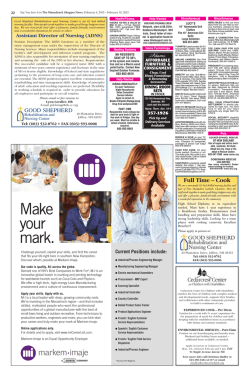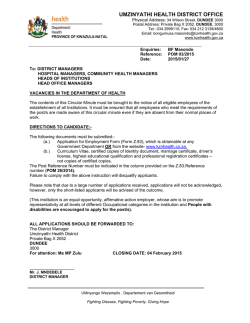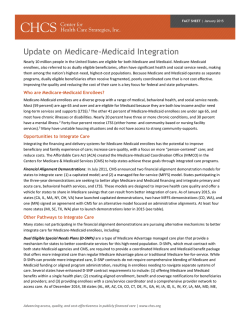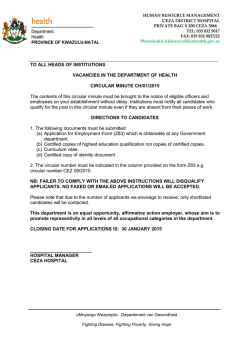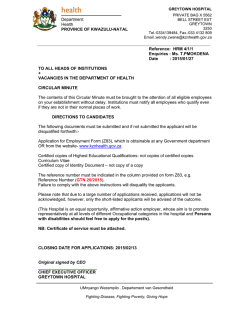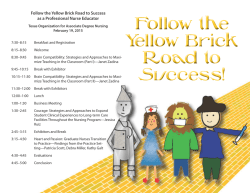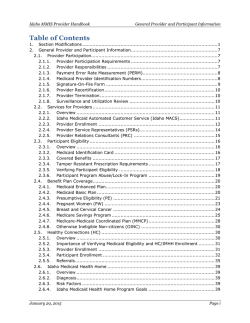
03 YOUR LIFE our inspiration 04 The Therapy Soap Box 06 KIDS
Viewpoint february 2015 • issue 015 03 YOUR LIFE our inspiration 04 The Therapy Soap Box 06 KIDS VIEW From the Desk of the Administrator... It has been a busy couple of weeks here at Park View as we having been dealing with the Influenza or “flu.” We have strict guidelines that the State of Wisconsin issues that we must follow when we begin to have an outbreak. An outbreak is defined as three or more residents or staff from the same unit with illness onsets within 72 hours of each other experiencing symptoms. These symptoms include: fever, chills, body aches, vomiting, diarrhea, cough, sore throat etc. We then stop activities and dining in the public spaces. We try to keep the residents in their rooms as much as we can to rest and to avoid spreading the infection. This can be easier said than done sometimes. Residents that have confirmed influenza must remain in their rooms for 7 days or until 24 hours after the resolution of fever and respiratory symptoms, whichever is longer, after the onset of their illness. Housekeeping increases the use of bleach as we try to kill any bacteria. The children from the child care do not come upstairs during this time as well. As we are approaching almost 2 weeks of remaining in our rooms and no group activities, we look forward to returning to some normalcy. Point of View By: Melissa Walthall, NHA The influenza hospitalization rate in Wisconsin has tripled the national rate. In the past two weeks, there have been over 600 hospitalizations for influenza in Wisconsin. Individuals over 65 represented 70% of the 2441 hospitalizations that have occurred this season. Disturbingly, the hospitalization rate for the elderly in Wisconsin appears to be three times the national rate. The elderly by far, both in Wisconsin and across the nation, constitute the population that is being hardest hit by the most powerful Influenza AH3 strain. What can you do? If you have not received your flu shot, it is not too late. Health Officials recommend people get their vaccinations to give some level of protection against the flu. Stay home if you are experience symptoms. Do not put others at risk by exposing them to your symptoms. Get plenty of rest and fluids. Most of all wash your hands and stay healthy. How to Pay For Nursing Home Costs Medicare, Medicaid, and other resources can help minimize the cost of long-term care. Odds are high that someone in your family will need a nursing home sooner or later. A majority of people over age 65 will require some type of long-term care services during their lifetime, and over 40 percent of people will need a period of care in a nursing home, according to the Centers for Medicare and Medicaid Services. The cost of that care can financially cripple a family. But there are steps you can take—whether a nursing home is needed now, next month, or next decade—to minimize the strain. 02 MEDICARE Seniors and their families facing a near-term need for a nursing home should first determine whether Medicare will cover at least a portion of the stay. The Medicare program provides coverage for rehabilitation—but not long-term care. If an individual has spent at least three days in a hospital for medically necessary care, Medicare will pick up the tab for up to 100 days of convalescent care immediately following discharge, as long as the patient goes to a home that’s a Medicare-certified skilled nursing facility and continues to show improvment. YOUR LIFE our inspiration We are pleased to have Esther Grand as our featured resident of this issue of the Viewpoint. Esther was born in a small town close to the ice box of the world, International Falls, MN on November 24th,1921. Her parents were Anton and Hilda Housker and she had a sister, Alma who was three years older. The girls attended the Spruce country school through 8th grade. Esther worked out doing housekeeping and child care and clerked in a grocery store / meat market. One day on the way home from swimming in the Roseau river (where they would dive off the railroad bridge unbeknownst to their parents) Esther got a ride from a young man, Floyd Grand. Three years later they met again at a barn dance and that dance lasted for the rest of their lives. They were married at her sister’s house on a beautiful sunshiny day, the first of January 1938. His brother and her sister were their witnesses. Esther was married in a blue dress that she had shopped for in Grand Forks and Floyd wore a nice brown suit. Floyd built a small house where they lived for a year and then moved into a bigger home in Roseau. Their family grew to include two daughters, Barbara and Kaaren, their spouses, nine grandchildren, twenty great grand children, four great great grandchildren and one more on the way. Barbara now lives in Baldwin and Kaaren in California. Esther was a stay at home mom until the girls were older. Then she worked out cleaning and We are glad to welcome ESTHER GRAND as our Featured Resident in this issue of the Viewpoint. painting in homes. Floyd’s sister owned a large independent grocery store on the outskirts of Roseau which was open 24 hours every day. Esther worked for her and would take care of the store when her sister-in-law was away. But by far her longest employment was for Montgomery Ward in St Paul. She was there for 28 years. When Floyd and Esther retired they moved to Cambridge, MN. It was there Floyd passed away in 1998. Esther moved to Baldwin and then to Park Place and is now a resident at Park View. She enjoys music, especially Danny O’Donnell CDs and any live music performers. Cooking and baking sessions, crafts, and exercise are all favorites of Esther’s but of course topping the list is time spent with family. We thank Esther for sharing her story with us. She is a joy to know. By Eric J. Walthall, Director of Marketing Medicare can also help if a long-term nursing home situation looks inevitable but isn’t immediately necessary. For as long as the individual is able to stay at home, Medicare can be tapped for up to 35 hours per week of home health services. Medicare covers home health services like intermittent skilled nursing care, physical therapy, speech-language pathology, and occupational therapy for up to 60 days at a time, called an “episode of care.” MEDICAID If an individual lacks enough savings to cover the cost of a nursing home—or if the cost of a protracted stay exhausts their assets—they can become eligible for assistance from Medicaid. To qualify for Medicaid, applicants must have minimal assets—no more than $2,000 in cash and cash equivalents such as bonds and IRAs. For married couples, the spouse staying at home may have assets worth an additional $115,920, the annually adjusted Social Security cap for 2013. While some seniors might be tempted to make large financial gifts to their children or grandchildren in order to hasten qualification for Medicaid, doing so within the five years prior to applying for the program could disqualify them from receiving its benefits. (Continued on back page) 03 THE THERAPY SOAP BOX Listen to Your Heart The medical term for a heart attack is Myocardial Infarction or (MI). A MI occurs when there is a blockage of blood flow, stopping the oxygen supply to the heart and causing irreversible damage to the heart muscle. The blockage is most often a result of atherosclerosis, a narrowing of the arteries from built up fat, cholesterol and plaque. Most effective way of surviving a MI is to know the signs and symptoms. However, not everyone experiences the same signs or symptoms. The treatment of heart diseases has vastly improved over the years. New high tech surgical procedures for detection and correction as well as new medications and cardiac rehab have been contributors to increasing the survival rate of a heart attack. • Heartburn or indigestion Cardiac rehabilitation is a therapy program to educate and promote heart health. Physical therapy provides exercises to strength the heart, education on the purpose and benefit of the exercise regime and monitoring heart restrictions. Occupational therapy provides education of cardiac precautions with activities of daily living and acknowledgement of signs and symptoms of cardiac concerns. 04 The most common are: • Tightness or pressure and/or pain in the chest • Aching sensation or numbness in the arms that may spread to back, neck and jaw • Shortness of breath • Cold sweat • Sudden light headiness or dizziness More often than not people have warning signs hours and or even days in advance. Please be proactive and contact the appropriate medical professional if you are experiencing any of the signs or symptoms above. Listen to your heart. CAUTION People with heart disease or who have a history of cardiac conditions should be viglant with follow general cardiac precautions to avoid further risk and complications of the heart. GENERAL PRECAUTIONS INCLUDE: •AVOIDING STEAM SHOWERS OR SAUNAS. Wet heat can increase blood pressure and heart rate. •IN FRIGID OR COLD TEMPERATURES ALWAYS WEAR A MASK OR SCARF OVER FACE TO WARM BREATH. The cold air can cause constriction of the blood vessels and decrease oxygen to the heart. •DO NOT SHOVEL! They describe some snow as “heart attack snow” for a reason. •KNOW YOUR BODY AND LISTEN TO YOUR HEART. Heart rate should not exceed over 30 beats from your resting heart rate with any exercise or activity. •DO NOT SMOKE!!!! No explaination required. •TAKE PRESCRIBED MEDICATION AS DIRECTED. •ALWAYS CARRY NITRO. Recommend renewing your nitro prescripition every 6 months. •AVOID PROLONGED BENDING OR REACHING AND ISOMETRICS ACTIVITIES. These activities can decrease blood flow, suddenly increase blood pressure and heart rate. •NEVER HOLD YOUR BREATH WITH EXCERTION. Holding your breath deprives your body from oxygen. Notifiy your medical professional immediately if you experience angina or shortness of breath with any activity. Proceed with caution and listen to your heart. Fun Fact: The average heart pumps 1,900 gallons of blood per day. 05 By: Ms. Amber GREET I NGS! 06 It is with great excitement that we can declare our “January Polar Vortex” is in the past, and everyone is enjoying the present winter thaw! The children are very excited about playing outside in warmer weather! Although the cold weather kept us inside, the children remained quite busy learning and playing! In January we learned about Bears, The Mitten, Polar Animals, and Snow. During our bear theme week we enjoyed reading the story Brown Bear, Brown Bear. We also had a teddy bear day in 4K! On this special day, each child brought a teddy bear to school. We sang a song with our bears, and we practiced sorting our bears by characteristics. The children also had a blast graphing gummy bears and playing in our 4K Teddy Bear Store! During our theme The Mitten, we enjoyed reading the story The Mitten by Jan Brett. This story is about a boy who looses a special mitten in the woods. Numerous forest animals come across the boy’s lost mitten and attempt to snuggle inside to keep warm for winter. We had fun recreating the story by singing a song. During our song, all of the children squeezed into an enormous mitten!! The children’s favorite part of the story was at the end, when the mouse landed on the bear’s nose!! This caused the bear to sneeze and all of the animals were sent flying out of the mitten!! It was so fun to see the children act out this story! During our Polar Animals week we also learned about the letter Pp. Throughout the week, the children enjoyed Pajama Day, Pink/Purple Day, and Parents and Pastries! On Parents and Pastries Day each child invited a parent or special person into the classroom to read stories and enjoy a pastry. The children loved having a guest in our room!! In January we also had 4K Gym Night. On this night, all 4K kids were invited to the Greenfield Elementary Gym. While at the gym, the children participated in a variety of fun activities with their friends and families. Scooters, hockey, basketball, and beanbag toss were a few of the fun activities provided at Gym Night. We are looking forward to having another Gym Night in February. It is such a great opportunity for families to engage in active play with their children. It is especially nice to have something for the families and children to look forward to in the long months of winter. During the month of February we look forward to learning about Dental Health, Nutrition, and Valentine’s Day. A dentist will come into our classroom to teach us the importance of taking care of our teeth. We will also learn about the letters Q and U. We will host the Q and U wedding in honor of the letters always being found together in words! The children are really looking forward to this fun event!! We hope that the winter season finds you in good health and happy spirits. Although the kids love being outside in any weather, we are really looking forward to the warmer weather that spring will hopefully bring! Sending Smiles, Ms. Amber F E B R U A RY C A L E N D A R Sunday, February 1 Joyce Knippenberg (from apartments) Monday, February 2 Groundhog Day Tuesday, February 3 Bingo:10:30 Thursday, February 5 Doris Schwartz Friday, February 6 TENANT GAME OF CHOICE! @ 3:00 Tuesday, February 10 Blood Pressure:10:15 Bingo:10:30 Therapy Exercise: 2:00 Wednesday, February 11 8:30 a.m., Breakfast outing Wednesday, February 11 SUNDAES: 2:30 Thursday, February 12 Kids View: 10:30 GROCERY: 1:00 Friday, February 13 2-3 p.m., February Birthday Party and Valentine’s Day Dance with Kid’s View children and Herb Nazer entertaining. Friday, February 13 DICE GAME! @3:00 Indicates Park View Event Saturday, February 14 HAPPY VALENTINE’S DAY! Sunday, February 22 Diane Trapp Monday, February 16 President’s Day Monday, February 23 WALMART: 1:00 Tuesday, February 17 3:15 p.m., Country Memories Entertain Tuesday, February 24 3:15 p.m., John Terkelsen entertains Tuesday, February 17 Bingo:10:30 Therapy Exercise: 2:00 Tuesday, February 24 Bingo:10:30 Therapy Exercise: 2:00 Wednesday, February 18 Ash Wednesday Wednesday, February 25 2:30 p.m., Pie and Coffee Outing 3:15 p.m., Margaret Mitchell Program Thursday, February 19 Kids View: 10:30 Zion Church: 1:30 Friday, February 20 10:30 a.m., Beach Party with the Kid’s View children 3:00 p.m., Happy Hour Friday, February 20 TENANT GAME OF CHOICE! @ 3:00 Friday, February 20 Maxine Witt (from apartments) Wednesday, February 25 PIZZA NIGHT: 5:00 Wednesday, February 25 Arlene Wangen Thursday, February 26 Happy Hour: 2:30 Thursday, February 26 Merry Hearts @ 11:00 Friday, February 27 Evelyn Van Riper Friday, February 27 TENANT GAME OF CHOICE! @3:00 Saturday, February 21 Laurel Nelson Indicates Park Place Event Indicates Birthday 07 Park View Community Campus 220 Lockwood Street P.O. Box 265 Woodville, WI 54028 Non-Profit US Postage PAID Zip Code 54028 Permit No. 26 Phone: 715.698.2451 Fax: 715.698.2363 Email: [email protected] Website: www.parkview-cc.com Park View Home is an equal opportunity provider and employer. Point of View By Eric J. Walthall, Director of Marketing (Continued from pg. 3) One way to find a qualified lawyer is to call your local bar association and find out which attorneys are teaching seminars on Medicaid planning to other attorneys. The attorney also must be licensed in the same state as the person needing Medicaid assistance because Medicaid laws vary from state to state. The National Academy of Elder Law Attorneys has an online search tool that can help consumers locate a lawyer near them. VETERANS ADMINISTRATION AID AND ATTENDANCE. This benefit program provides up to $1,733 per month to a single veteran who needs nursing home care, or up to $1,114 per month for the care of a veteran’s surviving spouse. If a couple includes one spouse who is a veteran and either of them needs a nursing home, they are eligible for as much as $2,054 in monthly assistance. Two veterans married to each other could qualify for up to $2,676 per month. RELOCATING THE PATIENT. If a senior who needs long-term care has children, grandchildren, or other relatives residing in a city or state where nursing homes are less expensive, moving the patient could be a good option. A move might not only reduce the cost of care but also make it easier for relatives to check in on the resident. Those deciding whether to move an elderly relative should consider the individual’s health and whether moving away from doctors who have an established relationship with the senior could harm his or her care. CONCLUSION We feel at Park View Community Campus, It is important that all potential residents and family members are abreast of the many financial options that are available. Financial burdens are always a pressured obstacle in our lives and it is our hope that you investigate the most suitable plan for you and your loved ones…
© Copyright 2026

